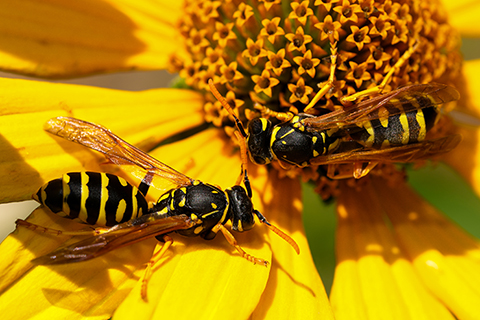How to keep wasps away from your patio
Wasps can quickly turn a peaceful afternoon on your patio furniture into a stressful experience. These stinging insects are attracted to food, and their presence can be disruptive and even dangerous. Fortunately, there are several practical measures you can take to keep wasps away and enjoy your outdoor space to the fullest. Let’s explore five effective ways to deter wasps and create a wasp-free environment on your patio.

1. Remove all traces of food (including compost or recycling)
One of the primary reasons wasps are attracted to your patio is the availability of food sources, including barbecues or garbage and recycling cans. To keep them at bay, make sure to promptly clean up any food residue or spills as soon as possible.
Do not keep pet food outside, as wasps are known to be attracted to it as well. Wipe down surfaces, sweep away crumbs, and dispose of any food waste properly. By eliminating these enticing food sources, you’ll significantly reduce the likelihood of wasps mistaking your patio for a snack bar.
2. Seal cracks and holes around your yard
Wasps are agile and can enter spaces through even the smallest cracks or holes. Inspect your patio area, especially in the spring when wasps are looking for a place to nest, for any nooks and crannies that may entice them. Use caulk or weatherstripping to seal gaps in windows and doors. Repair any damaged screens and fill cracks in walls or foundation. By blocking off these access points, you’ll prevent wasps from nesting on your property.
3. Set up a distraction
Creating a distraction away from your patio is an effective way to divert wasps’ attention. Consider landscaping away from your main outdoor seating area with a patio stone that holds food or a birdbath filled with water. This alternative food source will attract the wasps, luring them away from your patio. Regularly replenish the water or food to ensure the wasps continue to be drawn to the designated area instead of bothering you and your guests.
4. Put out wasp traps
Wasp traps are specifically designed to attract and capture wasps, offering an efficient solution for reducing their numbers around your patio. Place several traps strategically around your outdoor space, especially near potential problem areas. Commercial traps can be found in most gardening or hardware stores, or you can make your own using a plastic bottle filled with a mixture of sugar water or fruit juice. Remember to empty and clean the traps regularly to maintain their effectiveness.
5. Use repellants
Repellants can be a valuable tool in keeping wasps away from your patio. You can choose from a variety of options, such as insect repellent sprays or candles. Additionally, certain essential oils, such as peppermint or clove oil, are known to be effective natural repellants. Planting insect-repelling plants, such as marigolds, basil, or lemongrass, around your patio can also help deter wasps and add beauty to your outdoor space.


